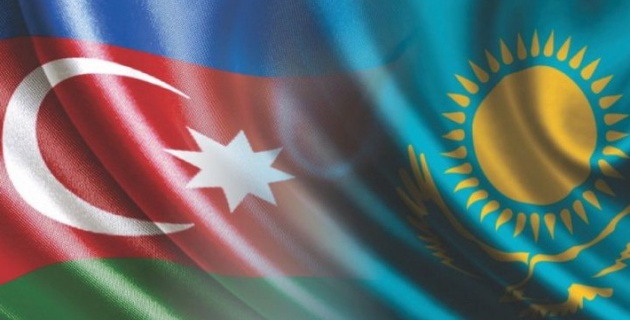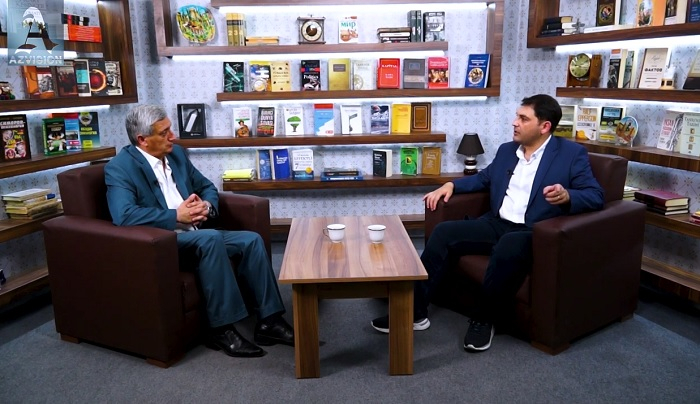Establishment of economic cooperation at the regional scale is very significant to neutralise the consequences of the global economic crisis. In this regard, the establishment of the Azerbaijan-Kazakhstan-Uzbekistan triangle may be of particular importance for the Central Asian and South Caucasus regions.
Economy expert Shamsi Rzali shared his views about the potential and prospects of Azerbaijan-Kazakhstan-Uzbekistan trilateral economic cooperation in his interview to AzVision.az.
- What is the level of economic cooperation between Kazakhstan, the leading country of Central Asia and Azerbaijan? What prospects exist?
- There are stages of cross-country economic integration. Our economic integration with Kazakhstan is at its initial stage. Both Azerbaijan and Kazakhstan are rich with natural resources - oil and gas. The major issue is the delivery of energy resources of the Caspian Sea to Europe, where two main countries come forward: Kazakhstan and Azerbaijan. Cooperation between Azerbaijan and Kazakhstan is not only for bilateral benefits. It also contributes to the energy security of the European Union. However, signing of the large-scale bilateral agreements of China with Kazakhstan and Turkmenistan detracts Astana from ensuring Europe's energy security.
Due to similar economic backgrounds, there is not a big difference between the production configuration and components of the gross domestic product of Azerbaijan and Kazakhstan. Currently, the GDP of Kazakhstan is nearly 200 billion dollars, which is two times more than ours. There are mainly uranium resources in Kazakhstan.
The main prospect in the integration of Azerbaijan and Kazakhstan is that cooperation in the field of culture and education can be expanded. There are good universities in Kazakhstan that are included in the world rankings. Secondly, cooperation in the field of energy can be enhanced at the initial stage in order to ensure the energy security of the EU. The next stages of economic integration are prevailing in the long term. If we start with the European Union, it has an example in the world. Such integration takes nearly 50 years. However, there are many obstacles for bilateral economic integration, which we can address when the time comes.
- What prospects are opened by the Azerbaijan-Kazakhstan-Turkey trilateral declaration, signed on cooperation in the field of logistics and communications and Kazakh President’s visit to our country next month?
- Currently, the issue is about three corridors: the North, Middle and South corridors. The North corridor is not reliable for both China and the world due to the Russia-Ukraine relations. When it comes to the South corridor, the problems in Iran and Afghanistan come forward. In this case, only the Middle corridor stands out. Certainly, within China’s Silk Road project, there are Kazakhstan, Azerbaijan and Turkey. Here, the Middle Corridor must be secure.

For the security of the Middle Corridor, economic integration of Azerbaijan, as well as Turkey, with the Turkish republics in Central Asia is necessary. These countries must ensure free trade with each other. Customs tariffs between these countries must be reduced and their economic policies must be adapted. In the 10-year perspective, the main goal is to raise this bilateral integration. To increase. bilateral integration, trade should be unconstrained in the first phase. At the second stage, the flow of capital and labor resources should be unrestricted, and mutual visas should be eliminated. At the third stage, a common market should be established, and the economic policy should be adapted at the fourth stage.
At present, we start the first stage of this integration. The main target is to turn the Organization of Turkic States into the economic union similar to the European Union, and the steps are being taken in this direction. For this, countries should remove mutual customs tariffs and liberalize trade regimes, and all this serves to make the Middle Corridor much more secure.
- Is it possible to achieve cooperation with Uzbekistan, the second leading country without direct access to the Caspian? Is there enough potential and political will for this?
- Of course, it has prospects. For example, Uzbekistan, which has a similar economic background with us, is in the forefront in the field of machine building. It has close relations with America. Kazakhstan also has similar relations. Any integration has the potential to benefit, since these economies are still transitioning to the capitalist economy. Although it is said that the transition period has ended in theory, these countries are not producing high tech products. Let’s imagine that the trilateral integration has been established: We lifted customs tariffs and formed the joint market. However, we have few things that we can sell to each other. Economies are based on natural resources. For the development of the economy, its liberalization is also necessary. There is no other way. It is impossible to do these things without political will. The political will already exists.

Undoubtedly, economic cooperation is also based on ideological foundations. It is the same with the European Union. What were the foundational ideological principles of the EU? The formation of a common state of European nations. Indeed it is the last target of political integration. We also have ideological foundations - common language, religion and history. During the former USSR, this integration was broken as a result of the separation of Turkey from the Central Asian countries and Caucasian Azerbaijan. Of course, it also has prospects. The countries which were part of the former USSR are now slowly integrating. Then they will integrate with Turkey through Azerbaijan. Of course, it has great prospects. Yet it will have phases and will be realized in the long term. Thus, it is impossible to reach the final goal of this economic integration in 5-10 years.
- Can our economic and commercial relations with Uzbekistan be considered satisfactory? Can those agreements, signed within Azerbaijani President’s visit to Uzbekistan give rise to this process?
- They are not satisfactory. If I am not mistaken, mutual commercial relations are nearly 90 million dollars. Nevertheless, commercial relations of the Central Asian countries with Russia are large. Azerbaijan and Uzbekistan do not have many mutual commercial relations,and it is also noted by the official bodies. Although the potential is great, the existing volume is low. It is possible to increase these commercial relations only through the textile and engineering sectors. Development of relations can be implemented through the countries getting to know each other both economically and socio-culturally. It must be noted that Turkic states do not know each other very well both politically and socially. If we prepare a report from Baku, we can see that few people have exact information about Turkic states. The situation is the same in Central Asia. For this, mutual political meetings of the presidents need to be intensified. Economic integration will not gain strength as long as political meetings are not intensified. Economic integration always comes after political cooperation. Intensified meetings between the leaders will contribute to the trade volume in any case. Integration of liberalized economies will increase both the GDP of these countries and mutual trade relations. For this, a very strong political will and adaptation of legal regulations are of importance.

- What role can Azerbaijan-Kazakhstan-Uzbekistan trilateral cooperation play in ensuring food security, which is a major global problem now?
- It can definitely be beneficial for the region. If we take a look at the grain export, Kazakhstan is one of the leading countries. If the problem emerges, these countries may settle some agricultural problems through integration. If deep integration is achieved, the region will not experience any serious problems regarding agriculture and food. The field of agriculture is still topical in these countries with similar economic backgrounds. Thus, they are not completely industrial countries. Part of the population still works in the agricultural sector. It certainly has the potential and can address food security in case of deep integration.
More about: #TurkicStates














































